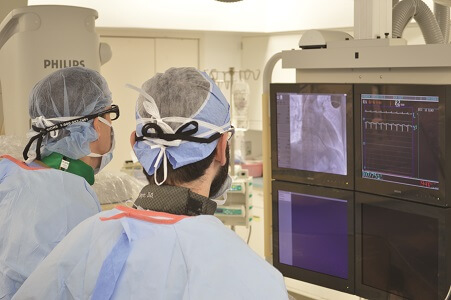 While certain heart conditions are still widely regarded as manageable and non-life threatening, McLaren Macomb cardiologists have championed new procedures to help patients regain the quality of life they once enjoyed.
While certain heart conditions are still widely regarded as manageable and non-life threatening, McLaren Macomb cardiologists have championed new procedures to help patients regain the quality of life they once enjoyed.
Although these conditions can be maintained with medication, many symptoms still persist, including fatigue, weakness, rapid heart rate, chest pain and nausea.
Medications, of course, are very beneficial to patients living with these conditions, said Loraine Cusumano, RN, BSN, MSA, director of cardiology patient care services, McLaren Macomb. However, if one qualifies for a procedure that is designed to significantly increase their quality of life, just think of the possibilities.
Chronic Heart Failure (CHF)
Chronic heart failure occurs when the heart is unable to pump enough blood to meet the body's demand.
According to the Centers for Disease Control and Prevention, more than 5.1 million Americans live with heart failure, leading to frequent hospitalization and a reduced quality of life.
Dartmouth Robinson, 67, of Macomb Township, is the first patient in Macomb County to be implanted with the new CardioMEMS sensor, a small device implanted into the pulmonary artery (PA) during a non-surgical procedure to directly measure PA pressure.
Increased PA pressures, a measurement of worsening heart failure, appear before more noticeable symptoms.
Patients living with heart failure struggle to maintain a good quality of life due to fatigue, shortness of breath and fluid retention, said Timothy Logan, DO, cardiologist, McLaren Macomb. With this device, treatments will be proactive instead of reactive, improving quality of life.
The new system allows patients to transmit daily sensor readings from their homes to their physician, allowing for proactive management of medication.
The procedure lasts less than an hour and the implant is designed to last a lifetime with no maintenance. Patients take a daily reading by lying on a special pillow, which then sends the information to the physicians for monitoring.
It's incredible,Robinson said after a month with the implant. I feel so much better. The doctor has called once or twice, changed my medication a little, and that is it. Whole lot easier than having to go to the hospital.
Chronic Total Occlusion (CTO)
A chronic total occlusion of a coronary artery describes a condition in which a heart blood vessel is completely blocked for at least 30 days. The blocked heart blood vessel restricts blood flow and deprives the heart of oxygen. Angina or chest pain is caused by the heart not receiving sufficient blood flow.
In the past, a CTO was treated with medication or open heart surgery. Now, there are new ways to treat heart blood vessels that are 100 percent blocked. These blocked heart blood vessels can now be re-opened with advanced tools and minimally invasive techniques.
Symptoms of angina vary and may include chest discomfort, shortness of breath with activity, and severe fatigue. Chronic total occlusions can negatively affect a patient's quality of life.
A number of studies have reported significant improvements in quality of life measurements after the procedure, said M. Blair DeYoung, DO, interventional cardiologist, McLaren Macomb. With increased blood flow comes fewer symptoms, leading to a more enjoyable life.
Linda Trongo, 60, of Warren, has been living with CTO for so long, and the symptoms increased so gradually, she had learned to live with it.
I have so much more energy now and less shortness of breath, she said three months later. It was quite a surprise, since I hadn't really noticed the effects of the symptoms because they were so gradual.
Trongo used to have to stop two or three times while cutting the grass due to low energy and shortness of breath. Now, she does it all without stopping once.
Learn more at mclaren.org/macombheart
Risk Factors
CHF
- Alcohol/tobacco use
- Obesity
- Diabetes
- Heart attack
- High blood pressure
CTO
- Smoking
- Heart attack
- Diabetes
- Inactive lifestyle
- High cholesterol